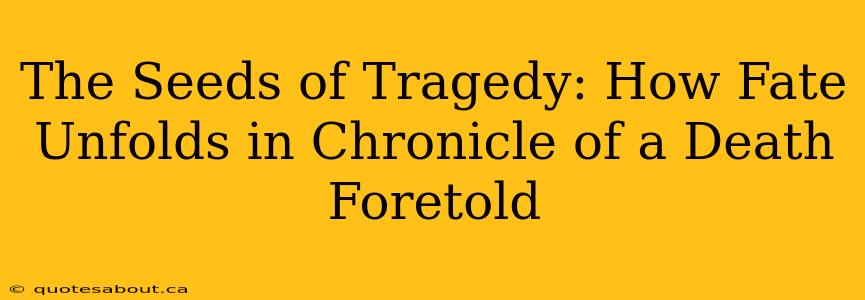Gabriel García Márquez's Chronicle of a Death Foretold isn't just a story; it's a chilling exploration of fate, societal pressures, and the devastating consequences of inaction. The novel meticulously unravels the events leading to Santiago Nasar's murder, revealing how a web of seemingly insignificant choices and ingrained cultural norms weave a tapestry of inescapable tragedy. This isn't a whodunit; the "who" is known from the outset. The true mystery lies in understanding the "why" – and how the foretold death becomes an unavoidable reality.
The Prophecy and its Weight: Was Santiago's Fate Sealed from the Start?
The novel opens with the knowledge of Santiago's impending death. This prophecy, whispered throughout the town, hangs heavy over the narrative. Does this preordained knowledge truly dictate the events, or does it merely highlight the characters' complicity in the unfolding tragedy? The narrative structure, jumping back and forth in time, underscores the inevitability of the outcome while simultaneously exploring the numerous opportunities for intervention that were tragically missed. The prophecy acts as a catalyst, not a determinant, exposing the fatal flaws within the town's social fabric and individual characters.
The Role of Honor and Masculinity: A Culture of Violence
How does the concept of machismo contribute to the tragedy? Machismo, the deeply ingrained code of male honor and dominance prevalent in the novel's setting, plays a crucial role in Santiago's demise. The Vicario twins' sense of wounded honor, fueled by their sister Angela's perceived defloration, becomes the driving force behind their brutal act. Their adherence to this rigid code, coupled with the societal acceptance—even expectation—of violent retribution, renders Santiago's death almost inevitable. The culture itself fosters an environment where violence is not only condoned but, in certain circumstances, seen as a necessary response.
The Collective Failure: Why Didn't Anyone Stop the Murder?
Why didn't anyone warn Santiago? This question lies at the heart of the novel's tragedy. While the prophecy is widely known, a pervasive inertia grips the town. Fear, indifference, and a strange blend of fatalism and superstition prevent anyone from effectively intervening. The townspeople, despite knowing of the impending murder, are paralyzed by a complex mix of factors, highlighting the devastating impact of collective inaction and the erosion of individual responsibility. The weight of the prophecy, coupled with the ingrained acceptance of violence within their culture, creates a suffocating atmosphere that stifles any attempt at prevention.
The Significance of Foreshadowing: Clues Missed and Opportunities Lost
What are the key foreshadowing elements in the novel? García Márquez masterfully employs foreshadowing throughout the narrative, dropping subtle hints that point towards the inevitable conclusion. These range from seemingly insignificant details, like the ominous dreams and the unsettling atmosphere preceding the event, to more overt warnings that are tragically ignored. The repeated emphasis on Santiago's obliviousness and the town's passive acceptance creates a powerful sense of impending doom. The foreshadowing isn't simply a literary device; it's a critical element that underscores the characters' collective failure to avert the tragedy.
Fate vs. Free Will: A Complex Interplay
Is Santiago's death purely a matter of fate, or did his choices contribute to it? The novel leaves the reader to contemplate the complex interplay between fate and free will. While the prophecy casts a long shadow, Santiago's actions (or lack thereof) contribute to his demise. His decision to ignore warnings, his pride, and his unwitting participation in the events leading up to the morning of his death are undeniable aspects of the story. The novel doesn't offer a simple answer; instead, it presents a nuanced exploration of how predetermined circumstances and individual choices intertwine to shape the narrative.
Conclusion: A Legacy of Reflection
Chronicle of a Death Foretold is more than just a captivating narrative; it's a profound meditation on fate, societal responsibility, and the consequences of inaction. The novel's enduring power lies in its ability to evoke reflection on our own complicity in the tragedies around us and the importance of confronting ingrained cultural norms that perpetuate violence. The seeds of tragedy are sown not only in prophecy but also in the fertile ground of societal indifference and the acceptance of violence.

